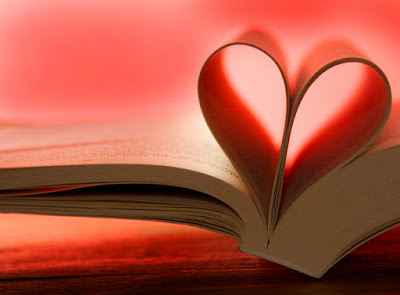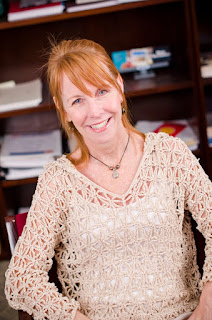In this
space, I like to mention how I came to know my guest blogger. This is
becoming difficult, as I'm blessed with such a wide and rich literary
community; I get to chatting with a fellow writer online, or at a conference,
emails or texts start flying, and before I know it, I can't recall how we first
came into contact. Such a great problem! So it is with
Bernadette Murphy. Let's just say: I'm glad we keep crossing paths!
Bernadette
is the author of Harley and Me: Embracing Risk on the Road to a More Authentic Life (Counterpoint Press, hardback May
2016, paperback May 2017), as well as three
previous books of narrative nonfiction including the bestselling Zen and the
Art of Knitting. She's an Associate Professor in the Creative Writing
Department of Antioch University Los Angeles, and a former weekly book critic
for the Los Angeles Times.
Did I
mention she's fierce and I admire her guts on and off the page?
Please welcome Bernadette Murphy
We
sit at our little desks, maybe sipping café
au lait, staring at a screen. Often, we peer out at a world we hold at
arm’s length, maybe through bespectacled eyes, always the outsider, the observer,
the one on the periphery. To passersby, we appear the portrait of calm and
ease. We’re writers, the nerdiest of nerds, the opposite of the REI adventurer,
the wimpiest of wimps.
Or
maybe not.
Red
Smith famously said, “There’s
nothing to writing. All you do is sit down at a typewriter and open a vein.” I
tend to agree, and believe
that the work of a writer, when done well, is as risky as any extreme sport I
can name—and requires the same kind of bravery and courage as other perilous adventures.
Maybe even more.
In
Maureen Corrigan’s take on the female adventure story in her wonderful book Leave Me
Alone, I’m Reading.
she argued that women’s stories have always seemed more placid than men’s, but
that the docile exterior is simply an illusion. In women’s stories, even the
most domestically focused, there is just as much at stake as with any testosterone-rich
alpha-male drama. A Jane Austen heroine trying to decide whom to marry has as
much on the line as a climber in a Jon Krakauer narrative on Mount Everest. If our
heroine makes a wrong choice, the consequences may be as dire in the long run
as a fatal error made by a mountaineer. It all comes down to the big questions
of life and death. As writers, this is the territory we mine.
Though
I’m a nerd through and through, I’ve found myself taking on more physical risk
recently and in doing so, I realized that the two territories overlap and feed
each other: nerd meets adventure, adventure meets the page.
In
essence, I’m discovering a new kind of tolerance for risk in my writing life, like
Lance Armstrong building up strong lungs. The more I engage in activities that
test my courage, my tenacity, both my emotional and physical strength, the more
I build the parallel muscles that writing requires: Truth telling. Rawness.
Vulnerability. The possibility of failure. Being willing to be unmasked as the
imperfect human I am. Without these qualities, our writing takes us nowhere,
has nothing to tell a reader about the human condition.
This
truth came home to me when I wrote the initial essay that would eventually become
my most recent book, Harley and Me: Embracing
Risk on the Road to a More Authentic Life. I had just left a 25-year
marriage and my skin seemed as if it had been flayed in big sheets. My guts felt
exposed, so that even the tiniest shift of wind hurt. I tried to write
authentically about the experience, but found myself hiding behind trite
metaphors and syrupy Hallmark sentiments. The more I attempted to remain safe
by concealing my true self (and, I hoped, protecting my kids from my desperate
feelings about the divorce), the more hackneyed my writing became.
Meanwhile,
my dear friend Emily Rapp was on the cusp of losing her not-yet-three-year-old
son Ronan to Tay-Sachs, a child I had held and cuddled and sang to. She wrote
about her thundering grief and the day-to-day experience of nursing a child to
his eventual death using a kind of incinerating truth I admired deeply and wanted
to emulate. (Check out her heart-stopping memoir, The Still Point of the
Turning World.) If she could tell the truth amid such tender-at-the-bone
circumstances, limn both the heart-stomping moments and the flashes of
unheralded joy, what was stopping me?
I
tried to follow her lead. When the first essay that displayed my conflicted, damaged
self was published, I cowered, nauseated by what I had written, terrified of what
people would think of me. I kept having a dream in which Emily was beheaded by
the Taliban. She was executed for her honesty—it was that dangerous and that powerful.
And if I continued in her path, what would become of me?
In
the meantime, though, I’d started taking more risks in the physical realm,
spurred on by a need to feel stronger in my life on a day-to-day basis. Facing
the death of my father and the pending divorce, I had the sense that, by training myself to take small risks and building on them
daily, I might shift my focus away from what scared me toward what made me feel
most alive.
I
started out running half a lap, walking half a lap at the high school track
with a friend from my kids’ school. We did a 5K and then a 10K together. Soon,
I learned to ride a motorcycle and took off on a 5,000-mile cross-country trek with
another scared-y cat mom like me. I went backpacking and hiking and ran
marathons. I moved to French Polynesia for three months to find out who I was
when I stopped being who I knew myself to be in Los Angeles. I learned to scuba
dive, ski, open-ocean outrigger canoe, mountaineer, rock and ice climb—all in
my 50s. And I discovered that I was stronger than I thought I was.
In
finding that physical strength, I uncovered the seed of bad-ass-ed-ness that
had long been buried in me. Over time, I stopped worrying about what people
would think. And, as a result, I was finally able to write the book I had been
wanting to.
Looking
back, I believe my creative paralysis can be traced to an insidious lie: The
idea that risk by definition is negative, a factor to be eliminated whenever
possible. Risk infers the possibility
that something bad or unwanted may happen. But risk, for writers, is imperative.
When
I first started taking physical risks as a path to both emotional and creative
courage, my behavior appeared capricious and unpredictable. So I looked into
the subject, craving assurance I wasn’t going off the deep end. Through
interviews with neuroscientists, researchers, and psychologists, I learned that
risk, the very element I’d attempted to isolate myself from, was the substance
that was making me feel healthier emotionally, encouraging the wonders of
neuroplasticity and neurogenesis, and building my self-confidence. I learned that by deliberately engaging new challenges,
even as simple as trying a different restaurant or gym routine, I improve my
happiness and safeguard my mental and physical health.
Yes,
there are biological, gender, and cultural influences that incline some of us to
be more enthusiastic about new experiences than others. Still, risk taking is
part of our human DNA, and for some of us, downright central to who we are. According
to researchers at Stanford University, the human body replaces itself with a
largely new set of cells every seven years to 10 years, and some of our most
important parts are revamped even more rapidly. Whether it's creating fresh
lung cells, shedding skin, sprouting new hair, or making fresh brain
connections, the human body is always in a state of constant flux and change.
So
too, I venture, is the human psyche—but only with our cooperation.
Be engaging risk, I
rediscovered my eagerness and curiosity, ultimately breaking out of my creative
straightjacket. Of
course, not all risk is beneficial. Impulsive, emotionally driven risk often
creates negative outcomes. But positive risk taking, undertaken with
forethought and intention, has become fundamental for me.
I
now approach life and writing with a new
kind of zest and enthusiasm. I feel emotions more keenly than before, even the
tender and piercing one—which, I would argue, is some of the riskiest territory
on the planet. Writing honestly is much scarier than skydiving, bungee jumping,
and any other X-game challenge.
As I see it, writers are extreme
athletes in the world of letters. By grappling with risk in the most demanding
realm of all—the world of the imagination—we prove ourselves as powerful and
fearless in the very best way.









